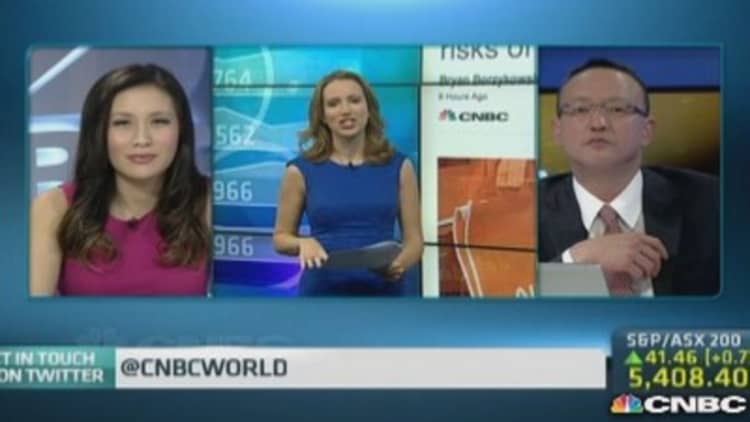
Since 2011, when about 40 U.S.-listed Chinese companies were accused of fraud, most Chinese-based operations stayed away from conducting an IPO on an American exchange.
That's beginning to change.
Many experts expect 2014 to be a strong year for U.S.-based Chinese IPOs, thanks to tech-hungry investors looking for strong growth investments. Stricter SEC regulations have also made investors less worried about getting burned by fraud.
Investors can expect to see around 20 of China's biggest companies list in the U.S. this year, said Christine Tan, an emerging markets portfolio manager with Toronto-based investment firm Excel Funds Management.
Among them: Alibaba, an e-commerce giant that's similar to Amazon; Weibo, China's version of Twitter; and JD.com, another e-commerce behemoth.
"It would be a shame if Chinese companies were dissuaded from listing in the U.S.," she said. "The country is home to some of the highest-growth tech companies in the world. It's an opportunity any investor would definitely want."
Brendan Ahern, managing director of KraneShares, an ETF company that sells Chinese-focused funds, agreed. The majority of the technology operations that will list this year are growing much faster than their American counterparts, he explained.
The average sales growth of the China-based Internet companies that KraneShares holds increased by 43 percent in the fourth quarter, which is several times higher than their U.S. equivalents, he said, adding that there are also 600 million Internet users in China, and that number should grow by at least 135 million in the next few years.
End of the reverse-merger era
For many Chinese companies, listing on the NASDAQ or NYSE is about prestige. It's a sign that these operations are world-class companies, said Ahern.
That wasn't always the case. Last decade a lot of companies made it on exchanges through reverse mergers — that's when a business lists by buying a shell company, often cheaply, that's already on a stock exchange — to make a quick buck off investors.
But after many of these operations were found to be making up numbers, the SEC tightened the reverse-merger rules and the strategy essentially died. Now companies have to pay hundreds of thousands of dollars to get on one of the main exchanges, which weeds out the more nefarious players, said Ahern.
Still, it's important for investors to do their due diligence when it comes to Chinese companies. They are foreign operations that can operate differently than U.S. businesses.
If you're interested in buying U.S.-listed Chinese stocks, here's how to do it right.
Start by looking at size. Many of the companies that did go bust were small- and mid-cap operations, so stick to large-cap companies, said Tan. These businesses are far more visible and often less cyclical than smaller ones, and many have products you can actually see being used.
She points out that popular search site Baidu, with a $55 billion market cap, is as good as Google; travel site C Trip, a $6 billion market-cap company, is as strong as Expedia, and Alibaba, which is expected to be worth $150 billion, will be as good a stock as Amazon.
With reverse mergers not being much of an option, the only companies that can list are ones that can afford to do it, said Charles Lee, a professor of accounting at the Stanford Graduate School of Business.
"To get an IPO, you have to be a certain size and partner with an investment bank," he said. "You have to be a much larger size to go the traditional route. It's much harder to do for a smaller company with less certain prospects."
Understand the company's business model. The best bets are the companies that you can understand. It's much easier to wrap your head around Alibaba's Amazon-like website and product offering than, say, how many trees a forestry company like Sino-Forest — one of the most famous reverse-merger frauds — is supposed to have owned.
Be sure to have a firm grasp of what the company is selling; the more you know about an industry, the better, said Tan.
For instance, emerging markets utilities carry a lot of regulatory risk, she said. It's nearly impossible for the average investor to know the ins and outs of this market.
A consumer staple or technology company, though, can be easier to evaluate, because you can see if people are using a product or not.
"Always think about the business model and whether it makes sense," she said.
Be sure you can make sense of its financials. Lee has found that the Chinese companies that have performed the best had positive cash flows, lower leverage and have been in existence for several years.
You generally want the same things out of a Chinese company that you would want from an American one — good free cash flow, little debt and, if it applies, a growing dividend, said Tan.
Pay attention to the auditor. It's crucial that investors buy businesses that employ one of the brand-name accounting firms to review the company's books, said Ahern.
These operations will employ local subsidiaries to crunch the numbers, but they should be following U.S. rules. Make sure the company uses the widely accepted GAAP guidelines for financial accounting and that they adhere to U.S. listing standards.
If a company is trying to compete with a U.S. company for investor dollars, its books should resemble a comparable U.S. business.
"If Baidu is the Google of China, their financials need to look like Google's do," said Ahern.
Evaluate the executive team. There are two things people need to pay attention to when it comes to a Chinese business's executive team: their education and their track record.
Many Chinese businesspeople have studied in the U.S. and worked at American companies before joining operations in their home country. The ones who have spent time here should be familiar with U.S. law.
"They're going to learn how investors view corporate governance and what are the best practices," said Ahern. "When they come back to China, they often bring a lot of that leadership and management skill set to their new company."
The executive team's work history can also signal success, said Ahern. See if the person has taken a company public before and if that business did well. Also look at how they're spending their company's money. Have they made smart acquisitions or prudently increased dividends?
"You're trying to glean what someone has done in the past to see what they might do in the future," said Ahern.
Watch out for related-party transactions. One of the criticisms leveled at Chinese companies has been around what's called "related-party transactions," said Stanford's Lee. That's when a CEO owns other businesses and does deals with those operations even if it's to the detriment of the listed company.
"A company could hire a supplier that might not be the best supplier, simply because that business is controlled by the shareholder," he said. "That's pretty pervasive in China."
Companies can get away with this, because one person often controls a large number of shares, and that shareholder typically wields far more power than the main shareholder of a U.S. company, said Lee.
Investors must find out who controls the most shares and then see if they're doing business with other companies that they hold.
"You need to keep this in mind," he said. "A related-party transaction may be done at a disadvantageous set of terms to the other shareholders."
While no investor can ever know exactly what's happening with a company, most experts do say that the problems that had come with investing in Chinese businesses are in the past.
The ones that will list this year are high-quality companies, said Lee. He has no doubt that when Alibaba goes public, its shares will be scooped up quickly.
"If people knew what this company was doing in China, they would be surprised," he said. "Their growth rate, dominance and penetration is staggering. It's a fascinating business."







